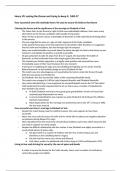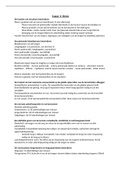Summary
Summary Henry VII, seizing the throne and trying to keep it
- Institution
- PEARSON (PEARSON)
This document provides a full summary of the chapter of Henry VII, seizing the throne and trying to keep it. This is the depth topic in Lancastrians and Yorkists option 30 Edexcel A level history. I used these notes in my mocks to get an A* predicted and have a place at Oxford for history
[Show more]




